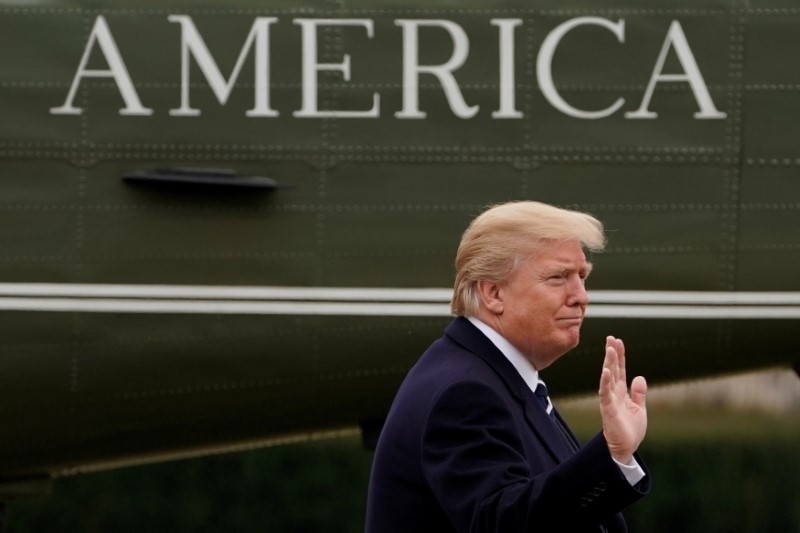(Bloomberg) -- The Trump administration shows scant sign of watering down its plan to impose stiff tariffs on steel and aluminum imports with carve-outs for specific countries, despite opposition from U.S. allies and Republican lawmakers.
The president’s trade advisers fanned out across television news shows on Sunday to defend the move, saying it was necessary to ensure the survival of the domestic steel and aluminum industries and would be put into effect soon.
In spite of pleas from Canada, Great Britain and other U.S. partners, shipments from U.S. allies will not be excluded from the action, they said. Some exemptions though may be granted to specific products deemed necessary to U.S. businesses.
“There’s a difference between exemptions and country exclusions,” Peter Navarro, director of the National Trade Council at the White House, said Sunday on CNN’s “State of the Union.” “There’ll be an exemption procedure for particular cases where you need to have exemptions so that business can move forward, but at this point in time, there’ll be no country exclusions.”
Navarro didn’t specify under what circumstances exemptions may be considered but they are likely to be confined to specific types of steel or aluminum products used by different industries, which may not be made at all in the U.S.
May’s Protest
“As soon as he starts exempting countries, he has to raise the tariff on everybody else,” Navarro said in a separate interview on “Fox News Sunday.” “As soon as he exempts one country, his phone starts ringing with the heads of state of other countries.”
In that vein, the U.K. Prime Minister Theresa May spoke with Trump about the tariffs on Sunday.
“The Prime Minister raised our deep concern at the President’s forthcoming announcement on steel and aluminum tariffs, noting that multilateral action was the only way to resolve the problem of global overcapacity in all parties’ interests,” according to a readout from her office.
Nafta Exemptions?
Meanwhile, Representative Kevin Brady of Texas, chairman of the House Ways and Means Committee, on Sunday said steel duty exemptions should be made for Nafta members Canada and Mexico. Brady spoke to reporters in Mexico City, where negotiators are in the seventh round of talks to renegotiate the North American Free Trade Agreement.
Trump is expected to sign a formal order for the tariffs in the coming week or the following week at the latest, after all legalities are finalized, Navarro said.
He defended Trump’s decision to set levies of 25 percent on imported steel and 10 percent on aluminum, a move that rocked financial markets and which critics say threatens U.S. jobs and ignites the possibility of a global trade war.
U.S. Commerce Secretary Wilbur Ross, who blanketed the airwaves on Friday to defend the tariffs, continued to press on Trump’s behalf and to downplay the possible impact of the move on U.S. consumer prices and jobs.
“We’re talking about a fraction of a penny,” on the impact on American consumers, Ross said on NBC’s “Meet the Press. “Retaliation isn’t going to change the price on a can of beer.”
‘What Fools’
The tariffs are part of Trump’s plan to counter what he says are decades of unfair trade practices and ill-advised trade agreements that have robbed the U.S. of revenue and jobs. During his first year as president, Trump withdrew from the Trans Pacific Partnership and threatened to tear up the North American Free Trade Agreement with Mexico and Canada unless changes are made.
“Our jobs and wealth are being given to other countries that have taken advantage of us for years,” Trump said Saturday on Twitter. “They laugh at what fools our leaders have been. No more!”
Some free-trade proponents have been hoping that Trump will reverse himself, much as the president has done in regard to past issues such as gun control and keeping U.S. troops in Afghanistan. But the comments by Ross and Navarro suggest the president plans to press ahead despite opposition from allies, lawmakers, and even some members of his administration, including Gary Cohn, director of the National Economic Council.
‘Up to Gary’
Responding to a question on whether Cohn might quit in response to the tariff decision, Navarro said it’s “up to Gary whether he goes or stays.”
Already-volatile markets swooned after Trump announced the tariffs, with the benchmark Standard & Poor’s 500 Index falling more than 1.3 percent that day. Foreign officials threatened retaliation, including European Commission President Jean-Claude Juncker, who said the bloc would target imports of iconic U.S. merchandise such as Harley-Davidson motorcycles and Levi Strauss jeans.
In multiple interviews Ross dismissed the threat to individual companies as a rounding error in the vast U.S. economy. “It may be painful for those particular companies but in the overall scheme of things it doesn’t mean very much,” Ross said on Fox News Channel.
Trump remains undeterred so far. In a Friday morning tweet, the President wrote that “trade wars are good and easy to win.”
